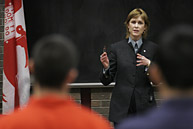Town Hall take two
Principal Heather Munroe-Blum kicked off her second Town Hall Meeting on February 4 by emphasizing her commitment to open communication with the university community. She acknowledged that her responsibilities make it difficult to interact with the 40,000 students, faculty and staff associated with McGill.

Principal Heather Munroe-Blum at the Town Hall, February 4
Owen Egan
"Every time I meet with members of the McGill community, I learn more," she said. She added that she hopes to organize three of these open question-and-answer exchanges each year.
Before fielding questions, Munroe-Blum followed up on issues raised at the Town Hall Meeting held late last November. She reported that the Dining at McGill Committee completed its report. Results will be circulated through senate and be made available shortly.
In an ongoing effort to reduce waste, McGill has adopted a policy allowing any document, including student papers, to be produced on the verso of previously used sheets of paper. "I would caution you to make sure you know what's on the other side," added Munroe-Blum, "otherwise it could be embarrassing." (Other concrete steps to improve McGill's environmental responsibility were itemized in the last issue of The Reporter.)
Principal Munroe-Blum said that she had met with the Muslim Students Association and her office is working with them to find appropriate, affordable prayer space near campus. In answer to the first question posed by Student's Society of McGill University (SSMU) president Andrew Bryan, she said it would be impossible for the university to grant a fourth extension on the current space when that agreement ends in May.
After a slow start, about 20 of the 120 people present in the Bronfman Building auditorium took advantage of the opportunity and posed questions during the meeting, which lasted over an hour. As moderator, Dean of Graduate and Postdoctoral Studies and Associate Provost (Academic Programs) Martha Crago ensured that everyone who went to the microphone was heard. Three-quarters of those who asked questions were students. A major concern was the affordability of a McGill education.
"We do offer the best deal in North America for what we've got," Munroe-Blum said. She conceded that McGill was not in a position to guarantee a place to every qualified student regardless of their financial situation, and underlined that this was a priority for her administration, but their hands are tied due to financial constraints. The university is lobbying the provincial government for more funding for the post-secondary education system as a whole.
Financial concerns, as well as the place of students in the university community, have led to the establishment of the Principal's Task Force on Student Life and Learning at McGill, an initiative Munroe-Blum was clearly pleased to see moving forward (see sidebar).
McGill's social responsibility, both internally and within the larger community, was also of concern to many of those who took the microphone. The only faculty member to speak — Greg Mikkelson, professor in the Department of Philosophy and the School of Environment — requested the option of placing pensions in environmentally and socially responsible funds. He cited a recent student study on the issue, as well as his own informal poll of 80 faculty members, both of which showed overwhelming support for the idea. Munroe-Blum said she would take the suggestion under consideration.
A Management student requested more classroom emphasis on ethical and critical thinking saying that he felt that he was being given "the tools without the context in which they operate." Munroe-Blum said that critical thinking was a priority and that it was a "hallmark of professional education at McGill," in Management, as well as in Law and Medicine.
A handful of staff members took the microphone. One raised environmental and aesthetic issues, especially during the summer months when the campus is primarily occupied by staff. He pointed out that often the campus is blighted by construction projects and the noise of lawnmowers and leaf blowers. The principal agreed that both were issues that could be looked into by Facilities Management. Other staff were also concerned with the accessibility of the Town Halls and whether the content of the meetings could be distributed more widely. Munroe-Blum said that the Town Halls are advertised widely, in posters, ads in the campus press and on the web. An effort is made to vary the times, days and locations of the events to allow as many people as possible to attend. The next will be held at Macdonald Campus.
The last student said that she was only able to attend McGill through scholarships and other financial aid. She wanted to know what the administration was doing to inform students of the enormous financial challenges facing the university, and getting the word out on the excellent programs and services provided in spite of this. Doing so would make McGill students better appreciate their time here.
"If we're happy now, we'll be happy in 20 years when we're alumni and making donations."
The principal responded that, indeed, the Task Force on Student Life and Learning would hopefully go a long way to improving student life on campus and their appreciation of McGill, but the reason wasn't in order to line up potential future donors.
"We want to make you happy now, because you've chosen McGill," said Munroe-Blum, ending the session.
